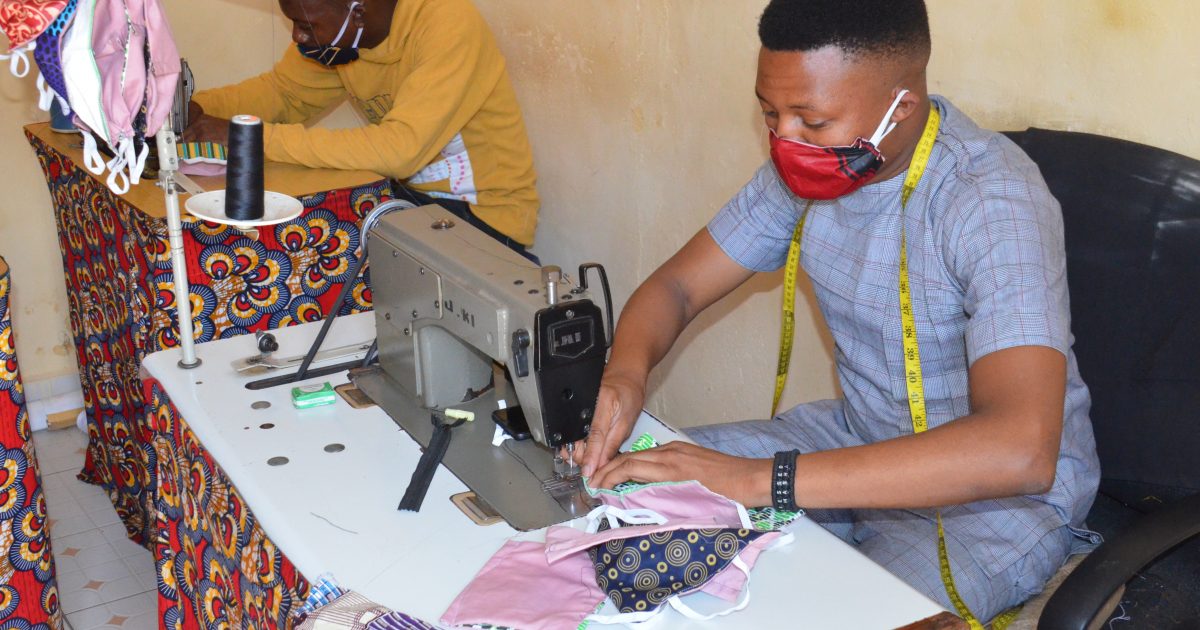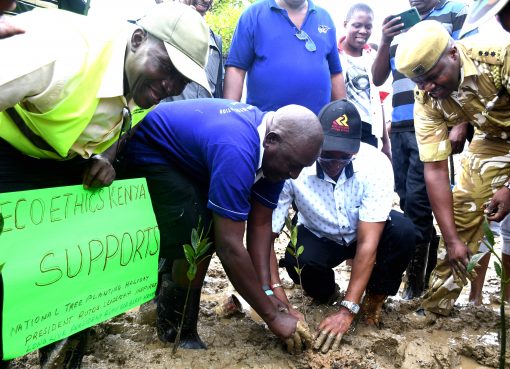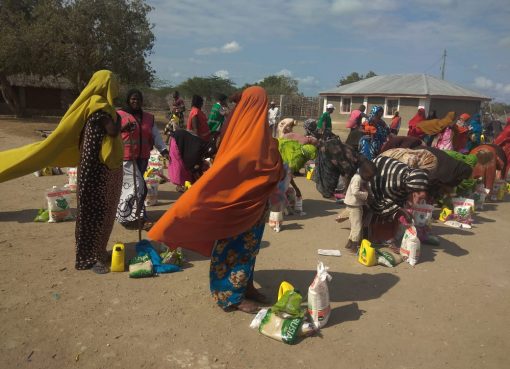

His face mask firmly in place, Mr. Daniel Masha bends over the sewing machine. His eyes are fixed on the needle, dancing up and down, as his fingers delicately feed a small strip of colourful kitenge cloth under the blurry needle. A continuous purr follows as his feet work on the machine pedal.
He holds up a kitenge piece that has been transformed into a customized face mask and scrutinizes it for any structural flaws. There are none. He slips off his mouth piece and smiles.
“This can fit on any face. The wearer can use it more than once too,” said Mr. Masha, the manager of Dressed by Masha (DBM), a small fashion shop, tucked inside one of the many business premises in Voi Central Business District.
While thousands of businesses across the world reel from the impact of coronavirus pandemic and thousands others in Kenya confront the grim reality of possible closure due to loss of clients, the spirit of adaptability and innovativeness amongst the youth is emerging as the face of the Kenya’s resilience in the midst of a catastrophe of global proportion.
Masha has over the years specialized in designing clothes for events like weddings, anniversaries and other special occasions, while dabbling in designing suits, kitenge dresses and any other unique wear for his clients.
In an industry populated by hundreds others, staying afloat was never an easy task. Stiff competition, difficult working environment and general decline in business ate into his industry.
Despite those challenges, he managed to educate his three siblings, pay his three staff and save a little money for a rainy day.
That was until the coronavirus pandemic erupted and brought his business to its knees.Orders stopped flowing; money stopped coming. He was not alone. His competitors were also
reeling from this abrupt loss of business. Shops stopped taking orders for materials while those who have already ordered started panicking on what to do with dead stock.
“For the first time, we went for over a week without a single order. People had stopped ordering clothes. We faced eminent closure,” he says.
Amid the gloom of looming closure, the idea to produce face masks’ came from unlikely sources; idle conversations from friends, random street banter and suggestions from well-wishers on Covid-19 and how world’s governments were responding to it.
“People now want masks to cover their mouth and nostrils,” someone observed in passing.
That was when a ‘nuclear bomb’ of possibilities exploded in the young man’s head.
Moments later, he was glued on his computer, digging up material from the internet. From how to design face masks to information on health requirements, size of human face and how to customize the masks, he read and took notes. This was a new lease of life for his dying business.
The dozens of rolls of kitenge and cotton material lying idle and gathering dusts in his store for weeks had found a new use. A shop, which had been on the verge of closure, has rapidly transformed into an epicentre of face mask production in the county.
“We have shifted from making dresses to designing facemasks. Masks are now what everyone is after. The demand is spiking,” he said.
Such adaptability in an environment, hostile to any business offers the only realistic chance of survival for small enterprises a time of great turmoil. With government’s interventions
such as subsidies to prop up business in informal sectors, innovation becomes the only way to stay afloat.
Masha’s DBM face mask is going for Sh.150. It has three layers; a kitenge outer layer; a cotton lining in the middle and a canvas piece on the inside. He adds face mask production that DBM meets the basic standards for prevention person-to-person transmission of the covid-19 through methods like sneezing and coughing.
“DMB is reusable. You can wash it at night and wear it in the morning unlike most other masks which are only used once and disposed,” he explains.
Already, four youth are employed in the shop to work on the masks. With an average production rate of between three hundred and five hundred pieces a day based on demand, it might be a new dawn for this youthful investor.
With a ballooning clients’ base that extends to the neighbouring counties of Mombasa,Makueni and Kwale, Masha says he is capable and ready to supply more masks if the need arises.
“We can handle big purchases. As a business, we do outsourcing which helps others to get some income during this hard patch,” he said.
Though on a limited scale, Masha;s resilience and adaptability offer some modicum of hope that it is possible to find a silver lining at a time of great difficulties. This is particularly
more poignant coming from young people who are confronted with enormous challenges in an environment of widespread unemployment.
Masha, who dropped out of Taita-Taveta University during his second year where he was pursuing Bachelor of Commerce, says his young workers are also graduates from diverse
professions but they share a passion for sewing. Amongst them is an Electrical Engineer, an Information Technologist and a Clinical Officer.
He added that job market needed innovation and creativity to meet demands of a rapidly changing world.
“Many graduates remain jobless because they wait for formal employment. We decided to pursue our uniform passions and carve a niche for ourselves,” he says.
DBM, unlike most local designers, utilizes the infinite potential of the internet research on designs and create unique and trendy pieces. Such moves have made the small start-up very popular with clients after customized and experimental designs.
Masha says the outdated perception that sewing, fashion designing and dress-making is a geriatric profession is totally misplaced.
“All you need is a passion and you will certainly carve a niche for yourself,” he added.
Paul Katana, 24 and a worker at DBM is an IT specialist. He said he could not get a job after clearing his diploma at Coast Institute of Technology.
“I knew nothing about sewing and clothes designing. I learnt it all here and months later,I was as good as I could be,” he says.
The face masks come in many colors and could be customized to suit individual tastes.
The kitenge, popular with most locals, has a quaint touch characterized by African cultural identity marked by vibrant colours.
Patrick Njama, a local butcher, already has a piece for himself and his wife. He says the mask feels better than the standard chemist-bought masks normally used by medics in health facilities.
“I feel more comfortable with this one. The other one reminds me so much of diseases and hospitals which is not a good thing at this time,” he says with a wry chuckle.
Already, orders are flowing in. Local chemists and pharmacy are buying to sell to their clients. Boda boda officials have engaged him on possibility of mass production to adhere to the The Ministry of Health directives on wearing of face masks.
At DBM, optimism soars high that the county government will support such initiatives to enable mass distribution of such masks.
“We want to do our small bit in keeping the public safe. We ask for all the support we can get,” Mr. Masha says.
By Wagema Mwangi





